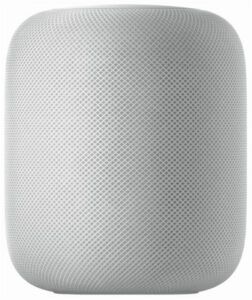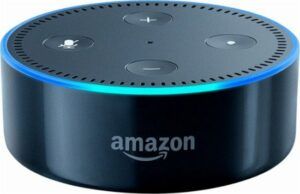Offices embrace machines that talk

Executives add efficiencies to their work day and life at home with personal assistant devices — they’re engaging wireless smart speaker products such as Google Home, Amazon Echo and Apple HomePod to do everything from playing a song list to shutting off the lights.
“It’s for the convenience,” said Ali Harris, founder and managing consultant of Technical Framework, an information technology services and web-design company headquartered in Fort Collins. “When we think about having to do all those tasks manually, it’s more difficult. If used properly, the digital voice assistant can make life easier and more convenient.”

The idea of personal or digital assistant devices came out of Apple Inc.’s launch of the Siri personal smartphone assistant in 2011, followed by Google Assistant, which powers the Google Home device, and Alexa Voice Service that connects to Amazon Echo. It’s easier to use voice commands than type on the small screen of a smartphone or Apple watch.
SPONSORED CONTENT
Business Cares: April 2024
In Colorado, 1 in 3 women, 1 in 3 men and 1 in 2 transgender individuals will experience an attempted or completed sexual assault in their lifetime. During April, we recognize Sexual Assault Awareness Month with the hopes of increasing conversations about this very important issue.
Digital assistants initially were used for smartphone-related tasks, like searching the web, making phone calls, sending texts and accomplishing other tasks. Users could get things like the news or sports scores and find out the weather just by asking.
Users also can do a whole lot more with their digital assistants, such as giving dictation, adding calendar items, compiling lists, stating personal reminders, ordering supplies or food for delivery, arranging ride sharing and getting directions while driving, Harris said. The digital assistants can serve as a real estate virtual agent, personal trainer, alarm clock or bedtime story reader to children, and they can help tune a guitar or be used to pair food with wine, he said.
With the advent of portable, hands-free speaker systems, the digital assistants can carry out manual tasks beyond getting information and helping organize and carry out tasks. They are capable of operating household equipment, playing music and audio books, setting alarms, streaming podcasts and providing real-time information.

“I have people asking about them and wanting more information,” said Zach Stubbs, mobile sales associate at Best Buy in Boulder. “They started to blow up over the last year.”
Executives, business professionals and other users speak into their smart speakers (and smartphone, too) to access their digital assistants, which operate through the cloud. With the speaker systems, they plug it into a power source, connect it to the WiFi and download the personal assistant app to perform the voice-commanded actions — and the assistant is able to recognize each user’s particular voice. Users start with commands like “OK, Google” or “Hey, Alexa,” followed by the verbal command for the tasks they want accomplished.
“It makes everything a lot easier, and it links to everything,” Stubbs said. “I don’t have to have three or four apps. I can use my voice assistant for it all. … I can control it with my voice, instead of using each app. That’s where the voice assistant brings everything together.”
The voice assistant works in the same format with the different brands of smart speakers, which are similar in how they function and carry out tasks, Stubbs said.
“There’s not a huge difference between devices. It’s going to be personal preference, based on looks,” Stubbs said. “They’re compatible with both Android or iPhone.”
At the home or office, users can speak into the speaker and have it adjust smart lighting (which require the purchase of a special outlet extension and light bulbs), control the thermostat, play from a song list or link to Spotify, iTunes or Pandora, lock or unlock smart locks (but while on site), and arm security devices without having to make a trip to the panel board.
Executives are using voice-controlled speakers to turn printers on and off, using a smart plug to conserve energy, or to help with presentations, such as playing a video while they are providing other information, Stubbs said.
“It allows you to be hands-free and keep talking to a group of people,” Stubbs said.
The digital assistant also can control appliances, command robotic vacuums and other home automatic devices, and start the car.
The appliances, along with the lights, security system and thermostat, are connected to a panel in the home or computer dashboard, said Brad Roths, technician at Millennium Group, a Loveland-based company that installs voice systems and manages information technology. The lights and thermostat can be programmed to turn on and off at certain times of the day or operate through voice command, he said. Other things that can be programmed are blinds, humidifiers, toaster ovens and automated coffee makers, with the settings keyed to a certain time of the day, he said.
“We’re talking a wide spectrum of applications,” Harris said. “You can be mobile throughout the office or home. You can have many digital voice assistant devices working together. You can automate tasks you would otherwise have to do manually and delegate tasks that are rudimentary or boring.”
Roths has a smart home operated with a digital assistant device — he began using Amazon Echo three years ago when it first came out, he said.
“You can tell Echo to brew your coffee without getting out of bed,” Roths said. “I can turn on the lights without having to go to the light switch. I can turn the temperature up on my way home from my phone. … I can tell Amazon to play on a certain speaker.”
Before, an intercom system had to be used for some of the tasks, like setting security systems, Roths said. The systems had to be wired from a main console to each room of the home and had to be installed during construction, he said.
“Being able to set timers and get information by talking to something is more attractive,” Roths said.
Some of the systems have motion sensors, notifying homeowners if someone approaches the house; or simplifying deliveries, allowing for packages to be set inside the home with the activity monitored by a security system, Roths said.
“It’s just the convenience factor. It’s not hard to turn the switch,” Roths said. “You can speak the command and it will respond. It does a lot of stuff, and it makes life convenient.”
Rob Protzman, owner of Chartered Technology in Loveland, uses his Google Assistant on his Android, he said.
“Primarily, I use it a lot for hands-free stuff while I’m driving, either setting calendar events, sending text messages and making phone calls,” Protzman said. “Safety while driving is a big piece of it. It’s definitely a timesaver to be able to put events on my calendar or send messages without having to pull the phone out and type. … Also, doing searches on the web for some information can be helpful. … It’s pretty accurate at getting done what I want done.”
But there are drawbacks to using a digital assistant related to privacy and security issues, Harris said. The commands users give to digital assistants are stored in a server in the cloud that others can access, along with the consumer data that is generated, he said.
“Your device may be open to hackers depending on the type of vulnerabilities you have. They can issue commands through your device to carry out tasks you don’t want carried out,” Harris said.
Executives add efficiencies to their work day and life at home with personal assistant devices — they’re engaging wireless smart speaker products such as Google Home, Amazon Echo and Apple HomePod to do everything from playing a song list to shutting off the lights.
“It’s for the convenience,” said Ali Harris, founder and managing consultant of Technical Framework, an information technology services and web-design company headquartered in Fort Collins. “When we think about having to do all those tasks manually, it’s more difficult. If used properly, the digital voice assistant can make life easier…
THIS ARTICLE IS FOR SUBSCRIBERS ONLY
Continue reading for less than $3 per week!
Get a month of award-winning local business news, trends and insights
Access award-winning content today!


